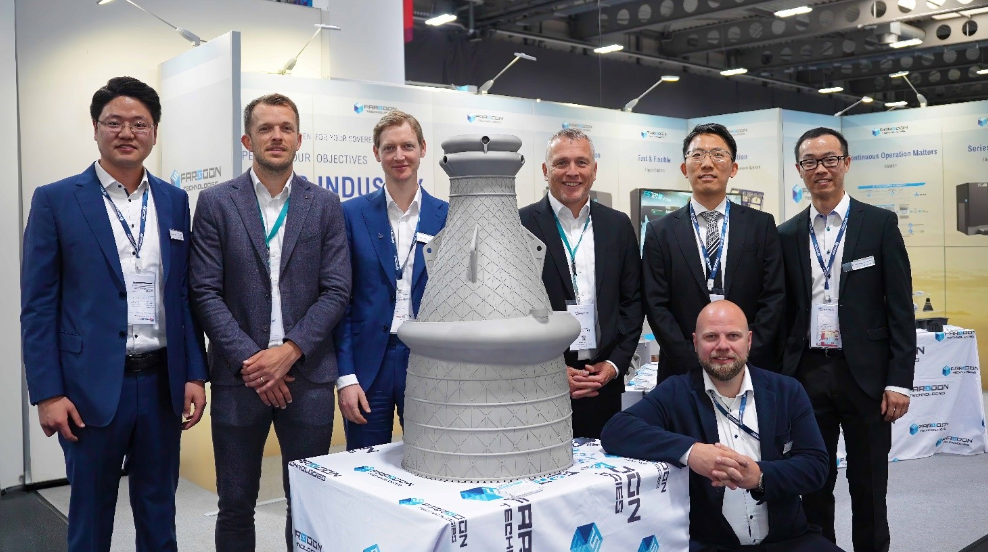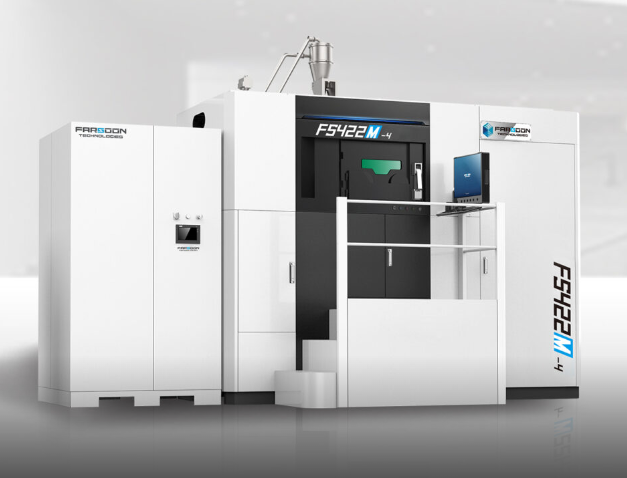Register now for our Additive Manufacturing Advantage online event for insights on AM developments in aerospace, space, and defense sectors from industry leaders!
Farsoon Europe and toolcraft AG have concluded a one-year Joint Development Agreement (JDA) aimed at aimed at advancing various aspects of additive manufacturing.
During the JDA, the focus was optimizing Farsoon’s additive manufacturing machines, developing parameters for AlSi10Mg alloy, and integrating Siemens NX software. Last year, toolcraft purchased Farsoon’s FS422M-4 Laser-Powder-Bed-Fusion (L-PBF) system for 3D printing metal parts. Farsoon supplied and assembled the system as agreed. It features four scanning/laser systems for high-quality component production, with a build cylinder size of 425 x 425 x 550 mm³ (including substrate plate). The system maintains exceptional surface texture even at high production speeds, particularly with aluminum powders, says the company.
“We are thrilled with the progress and results achieved during this collaboration,” said Oliver Li, Managing Director of Farsoon Europe. “The partnership with toolcraft AG has been incredibly productive, resulting in significant advancements in machine optimization, material parameter development, and software integration that will benefit both our organizations and the industry at large.”

Farsoon’s metal AM tech for versatile applications
Both companies are looking forward to continuing their collaboration with a focus on additive series production, aiming to leverage their combined strengths to drive innovation in the industry, says Farsoon Europe.
This April, Farsoon introduced the Support Reduction System (SRS) to address challenges in metal powder bed fusion (PBF). This technology aims to prevent stress and warping during the cooling process post-printing, thereby reducing the likelihood of cracking in overhanging structures.
It supports printing upside-down cone shapes and horizontal holes up to 50mm wide without additional supports, which enhances design flexibility and operational efficiency. SRS also enables the printing of shallow-angle features without supports, reducing material usage and shortening production times.
Focusing on the growing sports industry, Japanese lifestyle golf brand Designer launched titanium golf club heads manufactured using Farsoon’s metal 3D printers. These 3D printed golf club heads are engineered for strength and lightweight performance, incorporating innovative self-supported internal structures.
By leveraging Farsoon’s advanced technology, Designer aims to enhance players’ distance, accuracy, and stability with these high-performance products. Exhibited at the PGA Show in Orlando, these club heads are cost-effective to produce and offer superior strength and impact resistance compared to traditional stainless steel materials.
This was preceded by APWORKS collaborating with Farsoon and leveraging its FS422M-4 system to accelerate the industrialization of sustainable part production using Scalmalloy. The FS422M-4, equipped with 4 lasers and a printing area of 425 mm x 425 mm x 550 mm, met APWORKS’ criteria for high-quality serial production. In doing so, this partnership sought to provide reliable and environmentally friendly solutions for metal component manufacturing.

Metal AM synergies
As metal AM matures, partnerships between industry players are crucial. By working together, companies can address efficiency challenges, develop solutions for high-volume production, and open doors to new applications through combined expertise and resources.
Recently, Materialise and Renishaw announced a strategic partnership to boost efficiency and productivity for users of Renishaw’s AM systems. Through this collaboration, Renishaw’s RenAM 500 series integrates Materialise’s specialized build processor software and Magics software for data and build preparation.
This initiative targets workflow streamlining, enhancing process control, and reducing production times in metal 3D printing. The partnership addresses the growing demand in the industry for advanced software solutions capable of optimizing complex geometries and increasing manufacturing productivity across diverse applications.
US 3D printer manufacturer 3D Systems and Oerlikon AM joined forces to accelerate metal AM in the US. By combining their expertise, both companies aim to make it faster to produce high-quality metal parts for industries like aerospace.
According to the company, Oerlikon AM acquired a 3D Systems printer for its North Carolina facility to manufacture complex aluminum components. This collaboration leverages both companies’ knowledge in 3D printing and materials to deliver a validated production process for critical parts.
Join the Expert Committee for the 2024 3D Printing Industry Awards to help select the winners!
What 3D printing trends do the industry leaders anticipate this year?
What does the Future of 3D printing hold for the next 10 years?
To stay up to date with the latest 3D printing news, don’t forget to subscribe to the 3D Printing Industry newsletter or follow us on Twitter, or like our page on Facebook.
While you’re here, why not subscribe to our Youtube channel? Featuring discussion, debriefs, video shorts, and webinar replays.
Featured image shows Toolcraft and Farsoon team Farsoon’s booth in Rapidtech 3D Erfurt. Photo via Farsoon.


